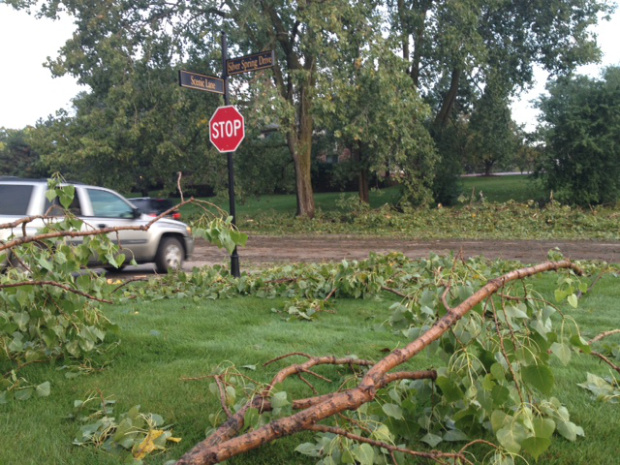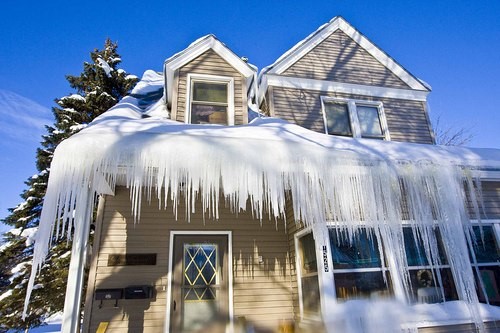TORNADOS, HAIL, AND FLOODS:
10 TIPS FOR PREVENTING SUMMER STORM DAMAGE

As residents of the Midwest, we know all too well not to keep our fingers crossed when it comes to weather. Though summer might ultimately be remembered for the sunny days picnicking in the park, boating on the lake, or lying on the beach, if you aren’t properly prepared for the summer’s inclement weather, you might end up remembering it for the wrong reasons! To help keep your families, homes, and vehicles safe this summer, Townsend Insurance – with the help of Integrity Insurance – offers these 10 crucial summer storm damage prevention tips:
General Storm Safety Tips
Is your family and home ready to endure another summer storm? Because summer storms can be so unpredictable, it’s important to have several basic safety and preventive measures in place. To help make sure your family is prepared and ready to respond at a moment’s notice, be sure to follow these two basic steps:
1.) Build an emergency/first aid kit. For your family to have everything they need in case of an emergency, your kit should include: First aid supplies, personal hygiene items, blankets, portable NOAA weather radio, flashlight, batteries, basic tools, work gloves, prescription medications, 3-5 day supply of non-perishable food and water, some cash, copies of important documents, and important contact numbers (medical centers, utilities, insurance agents, family members, etc.).

2.) Create and practice an emergency plan of action. When a severe storm is approaching, it’s crucial that your family has a plan to follow in order to stay safe. Make sure everyone knows where your safest meeting location is (e.g., basement), first-aid kits are, utility shut-off switches/valves are, and where to go if you get separated. In addition, make sure you have an emergency contact that you can communicate with.
Wind and Hail Damage Prevention
Each year, the United States will see an average of 1,000 tornadoes cause over $1.1 billion in property damage, 1,500 injuries, and 80 deaths. In addition, approximately 3,000 hailstorms happen annually across the U.S., with some hailstones reaching the size of softballs! To minimize the damage and help eliminate potential liabilities, we suggest following these four steps:

3.) Remove gravel landscaping material. In order to keep your siding and windows better protected during tornadoes and other storms with high winds, the Federal Emergency Management Agency (FEMA) recommends using shredded tree bark (mulch), as opposed to gravel, for landscaping materials in your yard.
4.) Maintain your trees and lawn furnishings. The leading cause of severe structural damage and fatalities during storms is falling trees and blowing debris. To help lower the threat of this happening, frequently check for and remove any branches or trees that could fall on your home during a storm. In addition, be sure to secure any loose lawn furnishings and other objects that could be moved by high winds.
5.) Use stronger shingles. The average roofing shingle isn’t built to properly protect your home from hail damage. In order to make sure your roof can withstand harsher hailstorms, install shingles rated by UL 2218 or FM 4473 as Class 3 or 4.
6.) Stay away from windows and doors. When the storm arrives, the last place you want to be is in harm’s way. Stay away from windows and doors during the storm, and move furniture away from the doors and windows before the storm arrives, if possible.
Flood Damage Prevention

If you thought hailstorms and tornados were bad, did you know floods damage and destroy more homes than any other natural disaster? In fact, floods cause more than $2 billion in property damage each year in the U.S.! And, with nearly 20% of flood claims coming from places where flood risk is low, they’re also fairly unpredictable. To help keep your home and belongings safe from potential floods this summer, try following these four tips:
7.) Repair cracks in your foundation. In addition to potentially damaging the structural integrity of your home, cracks in your foundation allow water to enter leading to flooding. Once you notice a crack, fix it immediately by patching it with mortar and masonry caulk or hydraulic cement. Do NOT use cement or mortar on its own, as it may crack again.
8.) Prevent sewer backup. To help prevent sewer lines from backing up into the standing water in your home, try installing backflow valves or check valves, which allow waste to only flow in one direction. You can install the valves yourself for a relatively low cost, or you can hire a plumber to install them for roughly $100 or more per valve.
9.) Install a battery-powered sump pump. Sump pumps provide a great defense against flooding, and are an excellent feature for pumping water out of your home. If the power goes out and your pump is powered by electricity, however, your basement could be in some serious trouble. Rather than risking the chance of not being able to use your sump pump, upgrade to a battery-powered option for a more reliable solution.
10.) Document your belongings. Though an ideal situation would allow you to store your valuable possessions in a safe location out of your basement, we know this isn’t always an option. Using a digital camcorder or camera, take videos/photos of your valuable items and save the footage in the safe place (whether it be online, on a USB drive, or hard copies). In addition to taking photos, be sure to also write down the item, manufacturer, model/serial number, date purchased, and purchase price to store with your documented inventory.
By following these 10 storm damage prevention tips this summer, Townsend Insurance hopes you can worry less about keeping your family, home, and belongings safe, and focus more on having fun! To learn more about your homeowners’ insurance coverage and rider additions that cover summer storm damage, contact your local independent insurance agent today.































